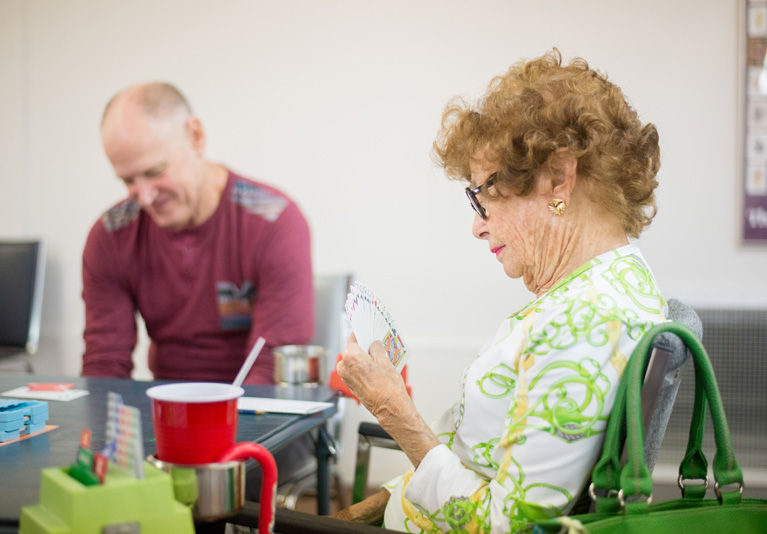
New medical research offers an intriguing possibility that people who try to stay mentally sharp into advanced age by playing bridge have a much better chance to delay the onset of Alzheimer’s disease – or maybe even prevent it altogether.
Naturally, the people running organized duplicate bridge all over the world have embraced that research whole-heartedly as the greatest advertisement for the game. The American Contract Bridge League (ACBL) has set aside the “Longest Day” of the year for Alzheimer’s celebrations and for years has encouraged all affiliated bridge clubs around the country to organize special games around the clock, or at least from dawn to dusk, with a portion of the card fees paid by players going to Alzheimer’s research.
This year for the first time, the Vero Beach Bridge Center participated in a significant way in the national celebrations. The local bridge club is the 8th largest in the country by number of tables on a year-round basis and Vero is known as a bridge-playing community. Many people specifically choose Vero Beach as their retirement home because of the possibility of playing very competitive bridge. But still, the end of June is not really a busy time because of the absence of the snowbirds from up North who swell the ranks of the players in season.
This year the longest day of the year (June 21) fell on a Sunday and weekends often don’t see the best attendance, either, but Bridge Center Club Manager Martha Glassmeyer scheduled four special Alzheimer’s charity games in addition to an early-bird effort in April, a game of four-person teams on Sunday, June 21, and three games the following Monday, a morning game starting at 10 a.m., and two afternoon games, one for beginners and one in the “open” category.
In total, more than 200 players participated and raised $3,368 in table fees, individual member donations and in donated Director’s fees for the Alzheimer’s Association. Local Directors Betty Wiese, Maggie Eggleston and Jack Wilson all contributed their fees to the cause.
In a touching gesture, many bridge players who participated in the event wore a name badge of a friend or relative stricken with the disease to honor the victims.
“The summer is historically a ‘slow season’ for our club and this certainly added some excitement,” said Glassmeyer, the club manager. “We are pleased to contribute to such a worthy cause.”
The club was decorated in the purple-and-white colors of the event with balloons placed at strategic points throughout the bridge center, which is housed in a converted bowling alley.
“This is an important effort for this club,” Glassmeyer added. “Given the age of our club’s population, Alzheimer’s disease has touched many of our lives. Bridge is a great way to keep our own brains functioning at a higher level.”
The average age nationwide of ACBL members is about 70, but although no one keeps tabs on it, it is believed to be significantly higher for the membership of the Vero Beach Bridge Center.
In any event, a 100-year-old man just joined the club as a “rookie” member, and veteran members include 99-year-old Eleanor Baum, who has the bridge center’s kitchen name after her, and Georgia Pierpont, who will turn 97 later this summer. Pierpont recently played in a bridge game at Riomar Country Club where the combined ages of four players at the table totaled almost 400 years, an event that was memorialized in the New York Times by bridge columnist Phillip Alder as perhaps the bridge game with the highest combined ages ever.
The club’s membership lists boast several other nonagenarians, including John’s Island resident Lucy Jones, who admitted only to being over 90 as she arrived for last Monday’s special Alzheimer’s game. “In any event, on my last birthday my daughter gave me a pillow that said in dog years, I should be dead.”
Jones said she thinks it’s “wonderful” that the bridge club is supporting Alzheimer’s research. As to whether she believes the research that playing bridge can help prevent or at least delay the onset of Alzheimer’s, Jones said: “I know one thing – it sure won’t hurt.”
Jones then went on to prove her continued mental sharpness with a decent 47% game, just one spot out of the points for the top scorers.
“The Longest Day symbolizes the difficult journey of those living with Alzheimer’s disease and their caregivers,” said bridge center President David Garfield. “This fundraising effort supports Alzheimer’s care and research. By playing bridge, we are demonstrating that there is a fun game that may slow the onset of this disease.”
Some have questioned the research, saying that it’s a chicken-and-egg question. In other words, these naysayers contend that it’s only natural that there are no Alzheimer’s patients among older bridge players because once people get Alzheimer’s, they can’t play bridge any longer.
The fact remains that only about one-half percent of all people manage to live past age 90 without showing a single trace of dementia – and many of them still play bridge several times a week.
Most of the elderly members of the Vero Beach Bridge Club seem to take the same attitude as Lucy Jones. They want to stay mentally sharp, and even if playing a lot of bridge can’t totally prevent the onset of Alzheimer’s, they sure believe it can’t hurt.
The Vero Beach Bridge Center is located at 1520 14th Avenue. The club offers games throughout the week for all levels of players (card fees are normally only $7 for members) and in the fall starts up a full slate of lessons as well. The club adheres to the “zero-tolerance” code against rude or intimidating behavior to ensure all people can have an enjoyable experience at the bridge table. Call 772-562-3008 for further information.



